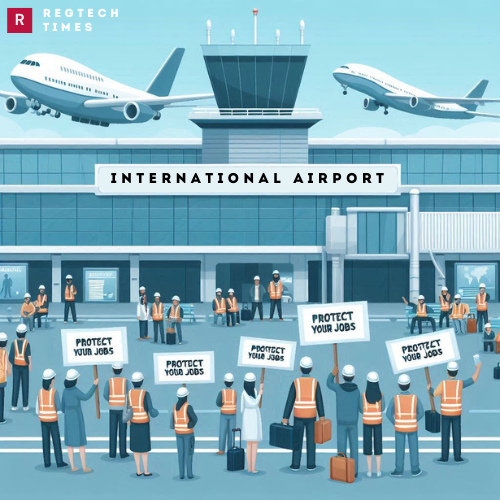A big controversy has erupted in Kenya after the Indian company, Adani Group, proposed a deal to run the country’s largest airport, Jomo Kenyatta International Airport (JKIA). The company known for managing airports and other large projects has offered to take control of JKIA for 30 years and expand its operations. However, this plan has sparked protests, court cases, and widespread anger from many Kenyans.
The biggest issue is that Adani’s proposal was made without any formal request from the Kenyan government. This kind of unsolicited bid has raised eyebrows and led many people to question how and why the deal was even considered in the first place. With a $1.85 billion price tag attached to the project, many Kenyans are worried about the consequences, especially since the deal was kept under wraps until recently.
As news of the deal spread, airport workers at JKIA went on strike. Many of these workers are worried that if Adani takes over, they could lose their jobs or face cuts in their wages. The strike was so serious that it brought the airport to a standstill, leaving passengers stranded and causing major disruptions to flights.
Why Kenyans Are Angry About the Deal
The heart of the controversy lies in the secrecy of the deal. Many Kenyans feel left in the dark about what the government and Adani Group have been planning. The fact that this proposal was made without any public announcement or discussion has made people suspicious. Even more troubling is the belief that the government didn’t follow the proper rules when considering the proposal.
This isn’t the first time that Kenyans have been angry over big deals made behind closed doors. In the past, other major projects that were kept secret turned out to be bad for the country, causing financial losses or damaging the economy. People are afraid this could happen again with the Adani airport deal.
Another concern is the huge amount of money involved. The project would cost $1.85 billion, and critics argue that Kenya could raise this money on its own without needing a foreign company like Adani to come in. They believe the country has the resources to expand and manage JKIA without relying on outside help. Many Kenyans are asking why their own government is willing to hand over control of such a major national asset to a company from another country.
Adding fuel to the fire is Kenya’s long history of corruption. Many people feel that big projects like this one are often used to benefit only a small group of people in power, while ordinary citizens and workers suffer the consequences. This suspicion has led to protests in the streets, with people demanding more transparency and better communication from the government about deals like these.
Court Cases, Strikes, and Ongoing Protests
The situation took a legal turn when several groups, including the Kenya Human Rights Commission and the Law Society of Kenya, took the matter to court. These groups argue that the government did not follow the proper legal procedures when considering Adani’s proposal. They also say that the constitutionality of the deal is questionable, as it seems to have been made without the public’s input.
In early September 2023, a high court in Kenya temporarily blocked Adani’s bid to manage the airport. The court order came after striking airport workers and angry opposition lawmakers made their voices heard. The strike led to serious disruptions at JKIA, grounding many flights and leaving passengers stranded. The workers, who fear job cuts and unfair treatment under new management, feel that their futures are at risk if the Adani deal goes through.
Adding to the controversy, documents shared by a whistleblower on social media have made the public even more suspicious of the deal. These leaked documents suggest that the government might not have followed the correct procedures, which has raised more questions about how transparent the process really was.
In response to the criticism, Adani Group has said that their proposals were made in accordance with Kenyan law. A spokesperson for the company said that both the airport project and another unrelated transmission line project in Kenya followed the country’s Public Private Partnership Act of 2021. They have also assured the public that they are a law-abiding company and always follow the legal rules of any country where they operate.
Despite these assurances, many Kenyans are not convinced. Protests continue as citizens demand to know more about what’s really going on behind closed doors. Workers remain on edge, fearing that their livelihoods could be at risk if the Adani deal is allowed to move forward.
For now, the deal is on hold while the courts review the case. However, with ongoing protests and mounting public pressure, it’s clear that this controversy is far from over. Kenyans want answers, and they want to make sure that their country’s assets and future are not being traded away without their knowledge or consent.


